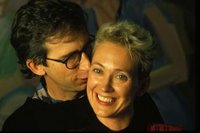 Breaking-up is hard enough at the best of times. But how much more painful must it be when one partner is a writer and draws on the pain of a relationship to provide fuel for fiction?
Breaking-up is hard enough at the best of times. But how much more painful must it be when one partner is a writer and draws on the pain of a relationship to provide fuel for fiction?Peter Carey's ex-wife, theatre director, Alison Summers found herself in the unenviable position of having to explain to sons Sam and Charley why they were all suddenly being beseiged by journalists around the world:'
Your dad has written a book and apparently the main character resembles him and the ex-wife resembles me in the way he has been talking about me the last three years.'Carey's latest novel Theft: A Love Story has just gone on sale in the US. It's a story of an art theft but features an acrimonious divorce between an Australian artist and a nameless woman he refers to as 'the Plaintiff' and 'the alimony whore'. The author denies any autobiographical reference, but Summers sees the novel as a thinly veiled attack and calls Carey 'a vampire' because, she says, he has consumed everything in her life.
(The whole story here and here in the Sydney Morning Herald and thanks Iolanda for the link. The picture above also from the SMH shows the couple in happier times - obviously.)
Of course, other authors have drawn on painful divorces and today's Independent has a list of them:
In 1984, the columnist Julie Burchill walked out on novelist Tony Parsons leaving him to raise their son Bobby single-handedly. He later published Man and Boy, a tear-jerking story of a single father and his son. Burchill says:
I've always been sceptical about how much the characters in Man and Boy resembled us - the runaway wife and mother is decent, slender and dull, while the saintly husband and father is attractive, good in bed and has all his own hair. Which, quite frankly, rules us both out.Touché!
Philip Roth's ex-wife, actress Claire Bloom, described him as "cruel, erratic and emotionally manipulative" in her autobiography. He exacted his revenge with I Married a Communist, in which the character of Eve Frame is based on Bloom.
Hanif Kureishi said of his novel Intimacy that it was about the demise of a relationship and he wanted to be "intentionally horrible - I wanted to write about an event as it happened".
Kureishi's former partner Tracey Scoffield, called the book was an unfictionalised account of the end of their relationship. She said his attempt to call the work a novel was "total hypocrisy - you might as well call it a fish. No one seriously believes that the book is only fiction. It all shows how little responsibility he feels towards his children."
Anyway, the moral of the story is just think twice before you marry a novelist!
Related Posts:
Kidnapping Peter Carey (25/5/06)
7 comments:
Great point. I’m sitting here wondering where the line should be drawn when it comes to our personal relationships and our writing. I suspect we’ve all done it at one time or another – taken that delicious stab at an ex with our pens, but since most of us are not internationally recognizable, maybe we got away with it.
Peace out,
Art plagiarises Life :-)
"I suspect we’ve all done it at one time or another – taken that delicious stab at an ex with our pens"
Not me. The phantom may not be a saint, but Christine is inviolate.
they're fair game, don't you think? anyway it's better than cutting all the sleeves off their suits or pouring white piant over their cars or stitching a nice rotting fish into the hems of their curtains or stuffing rocks into the car exhaust or taking a butcher's knife to them at dead of night ... isn't it?
we should print t-shirts that say, don't mess with me, i'm a writer ...
I'm not sure why, but it does seem that quite a few of the writers I like, especially and parcticularly those of the male species, have either a deeply troubled marriage, failed marriage, or multiple marriages. Off course, there are those whose marriages turned out beautifully, but I kinda get the sneaky feeling that (male?) writers can be a rather difficult lot to bear with, a kind of temperament, perhaps, or in the case of the male writer, the male ego?
Well, that would just ruin the memories. Everything _else_ is fair game, but not..
Never. Just to destroy the only thing of any value that I have left in this world ? there's a reason why the phantom never ever lays a hand on her, even after what she's done. There's a sort of secret understanding, of why things are, why things must be what they are. With no life, no love, and no future, why would I want to destroy the only thing that would give me comfort in my old age ?
dreamer idiot - maybe writing is a dangerous profession
anon - you're probably too nice to be a writer :-D
Post a Comment